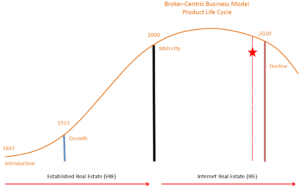The Death Of A Broker

Real estate brokers are the next victims of the digital age
At the age of 65, Gail started her new career as a real estate agent. With her children off in the world, and her husband off with his new wife (!), Gail didn’t have much to occupy her time. She wanted–needed–a new career, not least to help with retirement. So, after more than 20 years out of the work force, Gail summoned up all her courage, got her license, and started her new life as a broker. Gail was determined to serve as an ambassador for her town, helping newcomers find a home in a community she knew intimately.
What Gail found was supremely disappointing. There was lots of competition, of course, and relatively few customers to fight over. But that wasn’t all. It seemed the clients no longer needed her. Her clients–new parents, mostly, coming from the city–were younger and more tech-savy than she was. They already had all the information about the houses they were interested in before they even contacted the brokerage. It seemed her role wasn’t to play ambassador after all, but to baby-sit home visits, and sort through paperwork in the event of a sale. Would customers continue to pay the 3% commission her brokerage charged for these meager services?
Gail was sensing the beginning of the demise of the broker model. For decades’ real estate agents have earned their commission by serving two fundamental roles: first, helping clients find a home to buy, and second, actually buying the home. The first involved not only having privileged information about the inventory on the market, but also the ability to curate the right houses chosen to tour. The second could be simple–a matter of filling out paper work–or complex: multiple rounds of negotiation, complex deal dynamics, financial due diligence, inspections, etc.
By 2015, however, much of the task of finding homes for clients is beginning to slip away from brokers. While 88% of people still bought their houses through brokers, more than half did not find their house through their broker [1]. Gail did have one advantage over her clients: access to the Multiple Listing Service (MLS), the official National Realtor Association’s database of home sales [2]. Finding herself in an arms’ race with other realtors, however, Gail had to give this advantage away. She told her client’s to download the MLS application, and gave them her password. The fact is home buyers no longer need to go through brokers to get market data.
There’s evidence that in the future the brokers’ role in the curation process will be further diminished. Artificial intelligence is making inroads everywhere, including real estate. In 2016, Inman News, a real estate news source, pitted a human real estate agent against a computer program to see which could more accurately curate homes for an interested homebuyer in the Denver area. The results were stunning: the bot more accurately anticipated the homebuyer’s preferences every time [3]. Even for homebuyers who require high-level curation, brokers may no longer have a role to play in the future.
If Gail was no longer needed to help find client suitable homes, perhaps she could help them buy them? The trouble was this was the part of her job she found the most difficult. Gail had never taken a negotiations class. Her strengths were in local knowledge, not legal contracts. More than once she had made an error in the purchasing process, like forgetting to check if a buyer had been approved for a mortgage, or neglecting a technical inspection a ground well. These were jobs someone else could probably do more effectively than she could, and for less than the commission her firm charged.
In the digital age, the role of the real estate broker is rapidly evolving. Today, Gail is more task-master than ambassador. Most of her work involves touring prospective buyers around the houses they are interested in, and helping them run through a check-list in the event of a sale. Even this diminished role is threatened by technology, however, with the rise of things like virtual reality, drones, and online legal services. While the change is likely to happen slowly, by the time Gail finally retires it seems unclear there will be any brokers left to take her place.
[1] http://www.demonofmarketing.com/technology-and-the-decline-of-the-broker-centric-model/
[2] https://theamericangenius.com/editorials/broker-centric-vs-agent-centric-its-not-even-close/
[3] http://www.inman.com/2016/05/10/broker-vs-bot-winner/




Interesting post James, thank you. Due to employment circumstances prior to business school, I was required to move a few times over a few years and go through the process of finding a new place (not selling). From the buy side, I saw real estate agents as parallel workers that I could use to help me throughout the search process and to leverage their local knowledge applied to my specific circumstances. This was really helpful for me in saving time. While the data and information that I wanted about certain areas is available online, it seems like it’s available in pieces…leading me to believe there could still be a solid place for real estate brokers in the future. Undoubtedly technology will continue to dramatically change this industry though.